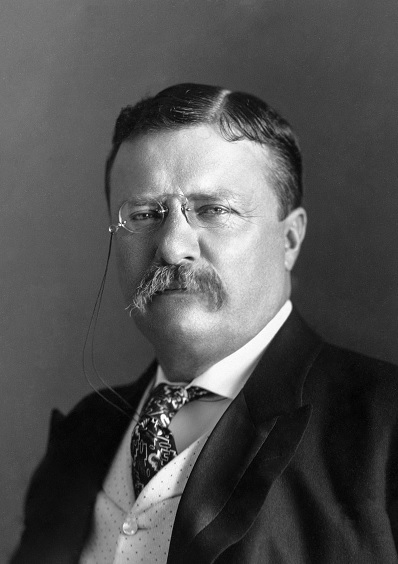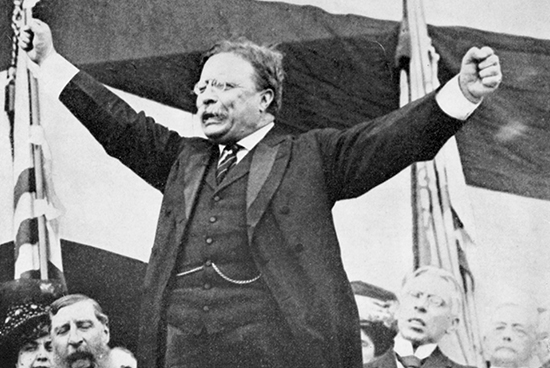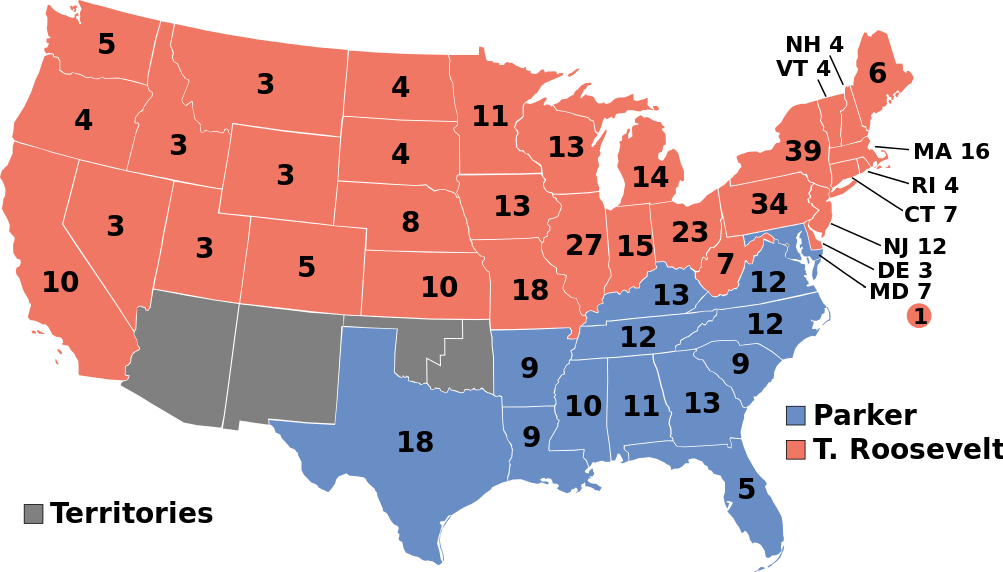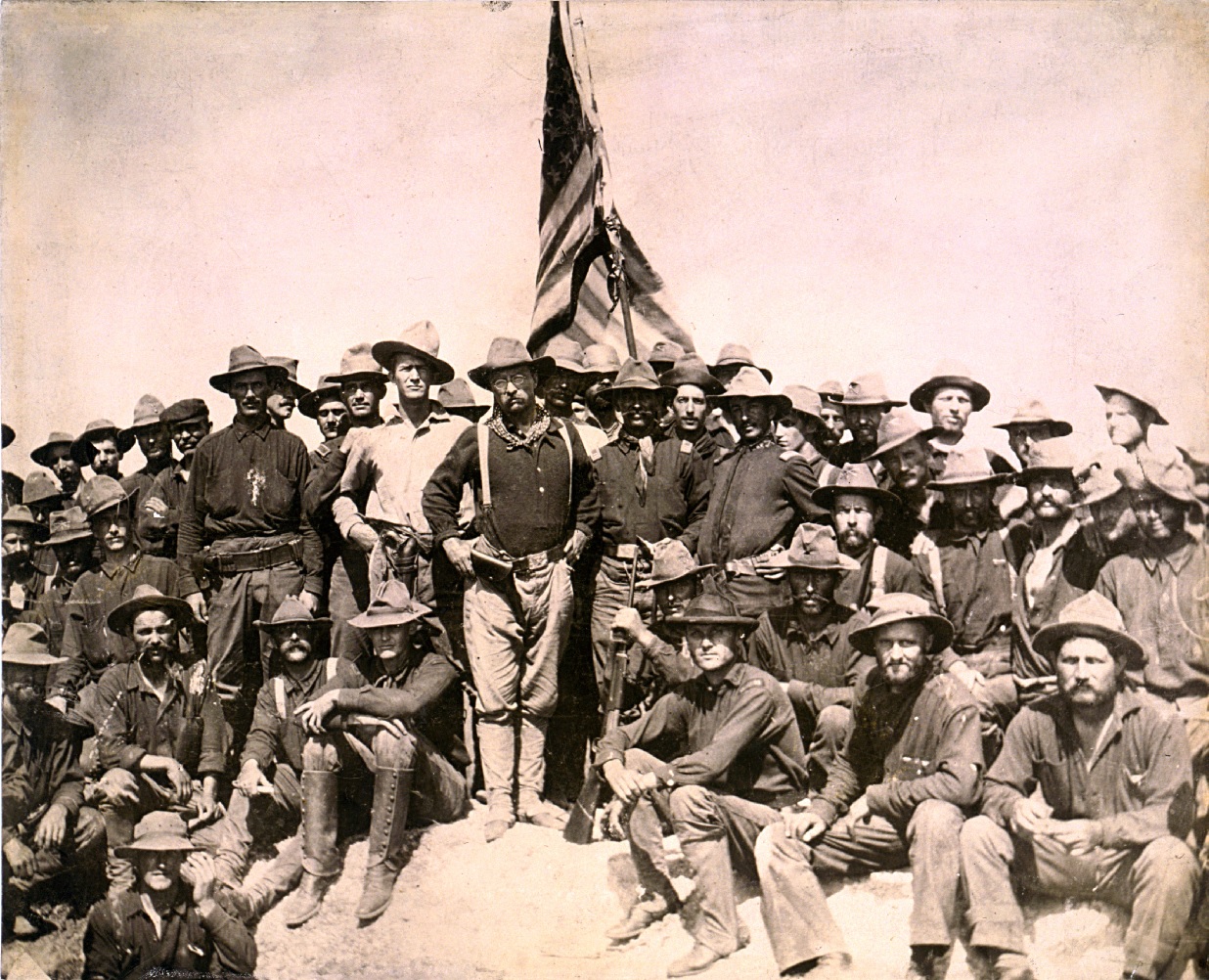A few days ago, I published an article about four presidents Donald Trump might most be like, mostly because of some fascinating similarities to various aspects of the modern campaign we just witnessed. Not surprisingly, some Trump supporters took me to task for being too cynical/judgmental/dismissive/etc.
As I stated at the outset of the piece, I was being all those things. And even though Andrew Jackson is first on my list and has been consistently ranked pretty high on presidential ranking lists for a long time, I was not trying to put The Donald in an echelon of leaders I hold great respect for. (2020 update: he is THE WORST).
Then my buddy Phil suggested that Trump might be like Teddy Roosevelt.
I hadn’t considered TR but instantly starting making some interesting connections. So let me put my objective historian cap back on and consider the possibility that the president who Trump will most be like could be one of the four faces etched into Mt. Rushmore.
Might Donald Trump be a Teddy Roosevelt 2.0? And would that be a good thing?
TEDDY ROOSEVELT–26th U.S. President (1901-1909)
So what is the TR template? He was one of a kind, probably the biggest character to ever occupy the White House.
 One category the two men differ on is age. JFK may be the youngest person ever elected to the presidency (age 43), but Teddy Roosevelt was the youngest man to ever take office (age 42). That succession happened after William McKinley was murdered at the Pan-American Exposition in Buffalo, New York in 1901. So TR was the youngest, but Trump just became the oldest person ever elected to the American presidency.
One category the two men differ on is age. JFK may be the youngest person ever elected to the presidency (age 43), but Teddy Roosevelt was the youngest man to ever take office (age 42). That succession happened after William McKinley was murdered at the Pan-American Exposition in Buffalo, New York in 1901. So TR was the youngest, but Trump just became the oldest person ever elected to the American presidency.
Speaking of oldest presidents ever elected, the last two before Trump were Dwight Eisenhower and Ronald Reagan. Both of them were Republicans and both served two terms. And we voted for youth in the following elections. After Eisenhower, JFK became the youngest president ever elected, and Reagan was followed by Bill Clinton, the third youngest president ever elected (TR beat him by one month). Sorry Bernie or busters, your Dems might need to go young next time around. (2020 update: Biden-Harris win)
Big character
Roosevelt was a New Yorker, like Trump, who was obsessed with masculinity. Teddy spoke of “the strenuous life” and demanded much of himself and those around him. Let’s just say his kids weren’t exactly sleeping in on Saturdays. His language on success is in the same ecosystem as the way Donald Trump and his siblings were raised to become winners, or killers as they favored themselves.
Both men had successful fathers who enabled a well-to-do upbringing. Theodore Roosevelt Sr. was a philanthropist who taught his son to live without selfishness or cruelty, not exactly the reputation of Trump’s father, but influential nonetheless. Both men also had brothers they dismissed as disappointing (to put it mildly), and both of those brothers drank themselves to death at a young age in desperate and tragic attempts to escape the piercing failure of living up to intense family standards.
Watch FRONTLINE: The Choice 2016 to learn more about Trump’s upbringing and life.
Personality wise, it’s interesting to compare the two. The New York Sun once described Roosevelt as “irrepressible, belligerent, and enthusiastic,” but he was also famously the guy who said, “Speak softly and carry a big stick, and you will go far.” Yes, TR could speak softly and lucidly, but he could also be a fiery orator who once finished a campaign speech after being shot by an assassin. The folded speech and eye glass case in his breast pocket slowed the bullet’s momentum, and he went for treatment after the rally. It’s not like he was bleeding from the mouth or anything so NBD.
Of course, Trump has no political or military experience, so there’s no comparison there to Roosevelt’s path from Harvard through state government and his turn as police commissioner of New York City. By 1897, TR was Assistant Secretary of the Navy, where he urged military buildup in an increasingly competitive global race for power.
Teddy was a bit unstable in his desire for military glory. He had a Lt. Dan (from Forrest Gump) streak in him. When the American battleship U.S.S. Maine exploded in Cuba, he was ready for a fight with the Spanish occupiers. He impulsively gave up post in government to go fight in the Spanish-American War where he “killed a Spaniard… like a jackrabbit.”
TR showed a pattern of doing things his way, whether giving orders without President McKinley’s knowledge or leading the famous charge of his Rough Riders up San Juan Hill on his own. He also defied the wishes of his family, particularly his 2nd wife, by leaving a cushy post in Washington to go play war. Military peers took notice: Teddy didn’t get his Medal of Honor until 2001 because commanding officers back in the day didn’t like his grandstanding, headline grabbing ways. Sound familiar?
Imagine a prominent political candidate running roughshod over such sacred American and military institutions as chain of command! As a candidate, Trump has famously declared disinterest in long-standing American traditions too, so maybe there is a bit of TR’s spirit there.

After returning from war, Roosevelt became governor of New York, where he got much training as an executive. The beginning of his presidential philosophy really started here. He would give everyone a “Square deal.” The common man gravitated towards him, a man’s man who authentically valued the concerns of Western folks too. That same populist attraction runs through today.
In an age of rampant political corruption, Roosevelt positioned himself as the incorruptible man. Good morals above all else was his way, he’d say, and America could count on his principled consistency.
Veep
Want a good glimpse into Teddy Roosevelt? Consider how events played out after Vice President Garret Hobart died suddenly in 1899. President McKinley and his people didn’t want to consider TR for the position because he was viewed by the incumbents in D.C. as too unreliable and unpredictable based on how he lone wolfed it before and during the Spanish-American War.
Teddy didn’t want the post either, seeing as how the office of VP was considered meaningless for most of American history (that would change after WWII). But Roosevelt’s rivals in New York were tired of him being around so they led the campaign to make him Veep in order to get him out of the Empire State.
President
TR definitely shifted the GOP in a more populist direction, as Trump likely will. One of Roosevelt’s agenda items that generated excitement along American Main Streets was his attack on trusts or large corporations. He believed in capitalism but railed against abuses of the system. Roosevelt brought more than twice as many anti-trust suits against big business than his three presidential predecessors combined.
His new power established, TR moved quickly to apply federal oversight to many businesses and industries. He’s responsible for the creation of the Cabinet level Departments of Commerce and Labor as well as the Food and Drug Administration. He also famously injected himself into a major labor dispute when the anthracite coal miners went on strike in 1902. With many Americans ability to heat their homes in jeopardy, Roosevelt intervened, an unprecedented presidential move. The strike was resolved and executive power in America had grown to more influence than any 19th century president would recognize.
He about broke the bank on executive orders, becoming the first prez to issue over 1,000 of them. Is that a lot? Put it this way: The first 25 presidents combined issued less than 1,300.
You might be thinking that so much government oversight doesn’t sound like the hallmark of a Republican. True, but in many ways TR was more Democrat than Republican. He was never easy to stereotype, and like the honey badger, he just didn’t care. Perhaps something we’ll end up saying about Trump.
Roosevelt created a new kind of presidency. One of the ways the office was forever changed was in how he brought the press into the White House in new ways. I bet Trump would appreciate how Teddy controlled the relationship between the media and the Executive Branch.
Executive appointments
One of the transition items of major interest is who Trump will surround himself with. The initial appointees have raised plenty of concern.
Roosevelt went through a number of people at just about every position, which is common for a two term president. TR was the first president to appoint a Jewish Cabinet member.
As for the Supreme Court, he selected three people who became justices. One served a few years, another almost 20, and the most significant, Oliver Wendell Holmes, served for 30 years until the age of 90, becoming the oldest SC justice ever. One of the most influential too., a man who moved from conservative to more liberal over the course of his distinguished career.
Civil rights
The most famous moment for race relations during TR’s presidency was when he had Booker T. Washington—a personal adviser who was black—to the White House for dinner. Segregation was so bad that while some African-Americans had been hosted by presidents for business, none had stayed to dine.
Reaction the next day was horrific, mostly from racist Southerners in the media and government. South Carolina Senator Benjamin Tillman, who worked tirelessly throughout his career to make sure that no black person ever felt equal to a white man or even safe after the Civil War, proclaimed that “we shall have to kill a thousand n****** to get them back in their places.”
Roosevelt was no saint, however. He saw the presence of blacks in America as a complicated issue at best and certainly said things that are problematic to our modern sensibilities. At least he always came back to each individuals’ character and even appointed a number of African-Americans to federal office posts.
Then again, when it came to Native Americans, his philosophy was scary in the “only good Indian is a dead Indian” kind of way.
I doubt TR would’ve openly mocked someone with disabilities—after all who could possibly do such a thing and get elected president—but he did say this in 1914:
“I wish very much that the wrong people could be prevented entirely from breeding; and when the evil nature of these people is sufficiently flagrant, this should be done. Criminals should be sterilized and feeble-minded persons forbidden to leave offspring behind them.”
Like all presidents, Roosevelt was a reflection of much of his time, including the people. But he wasn’t too rigid to evolve in his thinking, which is a trait of all good presidents. Over time, for example, he moved towards advocating for women more and more. The Progressive president seemed to move towards racial equality and justice more and more in his later years too, especially after seeing the bravery and honor of ethnically diverse troops during WWI, which made an impact on him.
TR certainly should have learned some things, seeing as he was perhaps the most well-read president ever. He devoured books by the thousands, reading several a day even, and he was equally prolific as a writer.
I’m sure I’m not alone in hoping that Trump becomes a voracious reader and student of history, as all other presidents seem to. Most of all, Trump needs to constantly evolve and rethink everything he thinks he knows. As TR did. As we all should.

Nationalism & Imperialism
Great presidents typically have faced great crises. Get a war during your term as president, and you’ll never be forgotten. One of the unique things about TR was how famous he became without facing the kinds of history changing events his fifth cousin Franklin D. would face as chief executive.
But TR’s time in office certainly wasn’t boring. Plenty of things were moving and shaking around the globe, such as concerns over “dangerous immigrants” flooding in from Eastern Europe.
Immigration is not a new issue in America. Our xenophobic tendencies were in full effect by the turn of the 20th century. TR welcomed immigrants, at least “the right kind,” which meant they better put the U.S.A. first. Of note is how he struck a more open and welcoming tone once he became president.
“We cannot have too much immigration of the right sort, and we should have none whatever of the wrong sort.”
At the time he assumed office, three presidents had just been murdered in the past 36 years. The last two had been shot by Eastern Europeans, who were viewed with constant suspicion, what with all the communism and anarchy over there. But TR tried to strike a proper balance between security and individual rights.
“It is unwise to depart from the old American tradition and discriminate for or against any man who desires to come here and become a citizen, save on the ground of that man’s fitness for citizenship… We cannot afford to consider whether he is Catholic or Protestant, Jew or Gentile; whether he is Englishman or Irishman, Frenchman or German, Japanese, Italian, or Scandinavian or Magyar. What we should desire to find out is the individual quality of the individual man.”
Can you imagine America today without all the great contributions from all those immigrants a century and more ago? How many of us wouldn’t even be here if they had been turned away?
TR’s era was one of empire building. The nations of Europe were scrambling to carve up Africa (or wherever else non-whites lived) for themselves. America got caught up in the frenzy too, not only in Cuba but in places like Puerto Rico, Guam, the Philippines, and Hawaii.
Few presidents shaped U.S. foreign policy as much as TR. He was known for Big Stick Diplomacy and is the individual who fashioned America as the world’s police. The belief was based on the idea that our strength and moral obligation required this nation to respond where injustices were being carried out by the strong against the weak. Sounds great, but there were often economic benefits to bullying the bully as well.
Roosevelt’s proudest legacy was probably his effort to get the Panama Canal built, which opened up transportation options between the Atlantic and Pacific Oceans. Trump has boasted about all the great structure he’s built. Will he build something great as president? I mean, assuming/praying it’s not a wall along the Mexican border.
Trump is unlikely to match TR’s Nobel Peace Prize, which he won for facilitating peace between Russia and Japan who were at war during his term in office. Not that everything became great between America and Japan, nor would it be for some time.
Finally, even the incorruptible Teddy Roosevelt could never quite shake allegations that he had been influenced in choosing the route for the Panama Canal. The media harped on it a lot though. At the end of his term, in 1909, Roosevelt did something that Trump would appreciate—he sued the newspapers that accused him of wrongdoing, including Joseph Pulitzer’s New York World. The cases were dismissed, and I guess he was innocent since he so loudly told everyone they were wrong.
What else?
A few other miscellaneous notes:
- Sexual morality—TR was not accused of sexual impropriety as far as I know, and there are certainly no recordings of him celebrating it.
- Pop culture—The teddy bear is named after him. Not sure Trump will have a beloved stuffed animal named for him, although I think a Troll Doll could be fittingly called a Trump Doll, for both its matching hair and name that reflects Trump’s internet habits. (2020 Update: This actually became a thing).
- Environment—TR was a dedicated conservationist, which is one of the reasons liberals like him. He set up the U.S. Forest Service and got our National Park System established. At the same time, he loved to go hunting on safari, bagging exotic beasts that would make Trump’s sons drool.
- Party disruptor—Oh yeah, one of the most interesting parallels between the two men might be their effect on the Republican Party. They both caused major splits in the GOP, with TR going so far as to run for president in 1912 under a new party he created called the Progressive, or Bull Moose, Party.
Final analysis
TR created the modern presidency, making plenty of frenemies along the way. Conservatives love him for some views and hate him for others. Liberals feel the same way.
He’s been consistently ranked as one of the top 5 best presidents for a long time, largely because he used executive power in new ways to make life better for a greater variety of Americans. So if Trump could be anything like Teddy R., that would be shocking but positive. (2020 Update: Nope, Trump is the worst president in American history).
This country desperately needs Trump to surprise us, to be someone different than he’s been as one of the most repulsive political candidates I’ve personally ever seen on some pretty important issues.
I just want Trump to act like a good human, then history can determine whether or not he was a good president. But he’ll need to get America moving forward and not backwards.

